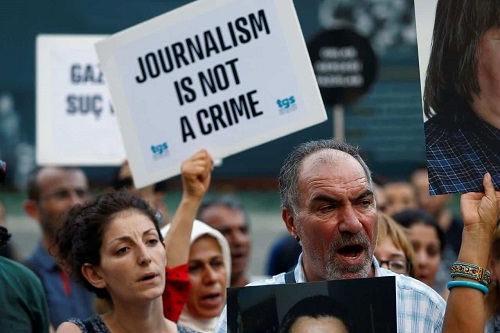Reuters photo
By
Tom Arms
It is enshrined in the First Amendment of the US constitution. It has been British Common law since 1688. It is a key element in the 1953 European Convention of Human Rights and the 2009 Charter of Fundamental Rights of the European Union. It is Article Two of France’s Declaration of the Rights of Man and Part of the UN Charter.
Freedom of the press and freedom of speech is—allegedly—chiselled in stone in almost every constitution in the world with the exceptions of self-recognised authoritarian states such as China, North Korea, Cuba and Saudi Arabia.
But according to the 2018 Press Freedom Index, released this week, this near universal commitment is observed more in the breach than the observance, and the breaches are occurring more often and—increasingly—in countries regarded as members of the democratic club.
Let’s start with the leader of the “The Free World”—the United States. America has fallen two places to 45th in the press freedom index. Reporters Without Borders, who produce the index, place the blame firmly at the door of the White House. What do you expect when the president emulates Stalin by referring to reporters as “enemies of the people?”
The EU—bastion of liberal democracy– is meant to be a democratic club. Support for democracy and a commitment to principles such as a free press are pre-conditions for membership. If a government backslides it faces fines, suspension of voting rights and—in extremis—expulsion from club membership.
But these deterrents have failed to stop an increasing number of EU governments. In Hungary (down two places to 73), Prime Minister Viktor Orban has accused Hungarian-born billionaire philanthropist George Soros of supporting independent media outlets in order to “discredit” Hungary in the international public’s eyes. Orban has branded him public enemy Number One.
In Austria, the leader of the far-right populist FPO party accused the public radio and TV broadcaster ÖRF of spreading lies. In Spain (down two at 31), the October independence referendum in Catalonia has resulted in government-fuelled harassment of pro-independence journalists.
In Slovakia, former Prime Minister Robert Fico set the tone by calling journalists “filthy anti-Slovak prostitutes” and “idiotic hyenas”. He then sued them. In the Czech Republic (down 11 places to 34), President Milos Zeman brandished a dummy Kalashnikov inscribed with the word “journalists” at a press conference after previously calling reporters “manure” and “hyenas” and suggesting they should be “liquidated.” He was speaking whilst standing alongside Russian President Vladimir Putin.
In Poland, anti-corruption investigative reporter Tomasz Piatek was threatened with prison after exposing the defence minister’s murky links with Russian-organised crime.
In Italy, 11 journalists are currently under round-the-clock police protection because of death threats from the Mafia.
Harassment, name-calling, threats of imprisonment and actual imprisonment are one thing. But they don’t hold a candle to the ultimate form of censorship: Death.
In two EU countries that was the fate suffered in the space of five months by journalists investigating political corruption.
Malta plunged 18 places to 65th in the Index. Journalist and blogger Daphne Caruana Galizia’s targeted car bomb death lifted the veil on judicial harassment and intimidation to which journalists are routinely subjected in the island state. Caruana Galizia had been threatened for years and at the time of her death was the target of 42 civil suits and five criminal cases.
Slovakia, down ten places to 27th, is still reeling from the murder of a 27-year-old investigative reporter Jan Kusiak who had been covering alleged corrupt links between politicians and the mafia.
Out of the 28 EU countries, only six of them are awarded top marks in this year’s Press Freedom Index. Britain, remains unchanged at 43rd on the list because of its traditionally tough libel laws.
Press freedom is more than a check on political excess and criminal activities. It stimulates debate and disseminates information across the entire spectrum of human endeavour. The free exchange of ideas and comments is a driving force behind the advancement of human society and there is a clear and established link between political and philosophical debate and commercial and scientific success. It is no coincidence that the most developed countries in the world are the ones who have enjoyed the freest press for the longest time.
Tom Arms
I am a journalist, entrepreneur and historian with extensive experience in print, web and broadcast journalism. I started as a diplomatic correspondent, wrote several books (The Falklands Crisis, World Elections On File and the Encyclopedia of the Cold War), and then in 1987 started my own business (Future Events News Service, www.fensinformation.com) which over 25 years established itself as the world and UK media’s diary. Our strapline was: “We set the world’s news agenda.” I sold FENS in December 2012 but retained the exclusive broadcast rights to all of FENS data. To exploit these rights I set up LookAhead TV which produces unique programmes which “Broadcasts Tomorrow Today” so that viewers can “Plan to Participate.” LookAhead has appeared regularly on Vox Africa, Radio Tatras International, The Conversation and Voice of Africa Radio.
In addition to being a syndicated broadcaster and columnist on global affairs, Tom is also available for speaking engagements and can be contacted on Twitter, Linkedin and email: [email protected].



All strong and valid points, and worthy of the most vigorous defense. The press must remain free.